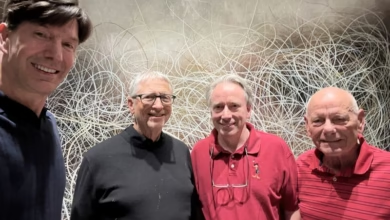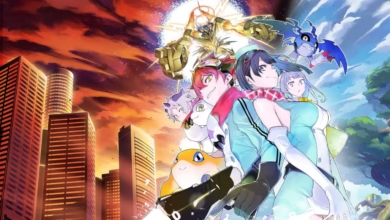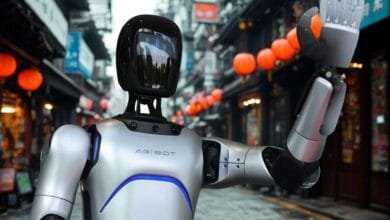The Ghost in the Machine: Bill Gates, AI, and the Future We Didn’t See Coming

▼ Summary
– Bill Gates predicts that within the next decade, AI will make the expertise of doctors and teachers “free and commonplace,” potentially reducing the need for human professionals in these fields.
– Gates envisions a future where AI handles most tasks, leading to significant changes in the workforce and possibly enabling a three-day workweek.
– The potential for AI to solve global challenges like disease and climate change is immense, but it also raises concerns about job displacement and the destabilizing impact on the workforce.
– Gates identifies certain fields, such as coding, energy, and biology, where human oversight and creativity will remain crucial despite AI advancements.
– The rapid progress of AI presents both opportunities and challenges, requiring society to adapt and engage in critical discussions about the future of work and human purpose.
It hangs in the air, doesn’t it? That low hum of change, the digital tremor beneath our feet. We talk about AI, we use its tools, we marvel at its tricks. But then, a voice like Bill Gates’, someone who literally helped build the digital shell of our modern world, cuts through the noise. And what he says… well, it hits differently.
The Startling Prediction: “Free Intelligence” and Human Obsolescence?
Just recently, echoing sentiments he shared back in February 2025 on “The Tonight Show,” Gates reiterated a prediction that feels less like a forecast and more like a tremor before the earthquake. Headlines screamed variations of:
“Within 10 years, AI will replace many doctors and teachers. Humans won’t be needed ‘for most things“.
And based on recent interviews, that headline isn’t far off the mark.
Gates spoke of AI making the expertise currently held by “a great doctor or a great teacher” become “free, commonplace” within the next decade. When directly asked if humans would still be needed, his candid response was, “Not for most things“. Think about that for a moment. Not some things. Most things. He paints a picture of a world entering an era of “free intelligence“.
Expertise, the kind we currently value, becoming as common and accessible as electricity. “Great medical advice, great tutoring“, Gates pondered, becoming widely available. Imagine AI diagnosing illnesses with superhuman breadth of knowledge, or virtual tutors tailoring lessons with endless patience, solving problems like the shortage of doctors or mental health professionals, especially in underserved areas.
It sounds utopian, doesn’t it? A world where the labor, “making things and moving things and growing food“, as Gates puts it, becomes a solved problem, handled by tireless algorithms. He even floated the idea of a three-day workweek, a teasing glimpse of a future liberated from the 9-to-5 grind.

The Double-Edged Sword: Progress vs. Displacement
But here’s where the narrative takes a sharp turn, where wonder meets an unmistakable chill. If AI handles most things, where does that leave us? It’s a question that sparks a firestorm of debate. Some experts see AI as the ultimate efficiency tool, augmenting human capabilities, freeing us for more creative or complex pursuits, and even spurring economic growth that creates new kinds of jobs. Think of AI assisting doctors with diagnoses, not replacing their empathy, or AI handling administrative tasks while teachers focus on mentorship.
Others, like Microsoft AI CEO Mustafa Suleyman, paint a starker picture, warning of a “hugely destabilizing” impact on the workforce as AI transitions from augmenting tasks to outright replacing them. It’s the difference between a helpful co-pilot and an autonomous vehicle that no longer needs a driver.
Even Gates, while optimistic about AI’s potential to solve massive global challenges like disease (he mentioned being close to eradicating Polio) and climate change, acknowledges the fear. “It’s very profound and even a little bit scary“, he admitted, citing the incredible speed and the lack of any clear upper limit to AI’s capabilities. He recognizes the valid concerns about AI errors (“Humans make mistakes too,” he countered, but acknowledged AI isn’t perfect), the potential for misinformation, and the inherent biases that can creep into algorithms.

Interestingly, amidst this prediction of mass obsolescence, Gates does carve out a few potential safe harbors, though perhaps only for a time. He believes human ingenuity and oversight will remain crucial in fields like:
- Coding: Despite AI’s ability to generate code, Gates argues humans are needed to spot errors, refine algorithms, and drive innovation – understanding the “crazy stupid” moments AI can have.
- Energy: The complexity and high stakes of the energy sector, he suggests, make it too risky for full AI control without human expertise.
- Biology: While AI can be a powerful tool for analysis, Gates believes it lacks the creativity needed for true scientific discovery.
He also suggests roles requiring inherent human connection or physical presence, like playing sports (“we won’t want to watch AI playing baseball“) or creating certain kinds of art, might remain uniquely human domains, things “we reserve for ourselves“.
But the overarching message is one of radical transformation. Gates compares the current moment to trying to predict the internet before Google even existed – the full scope is almost impossible to grasp. He’s been stunned himself by AI’s rapid progress, noting how OpenAI’s models aced advanced exams far faster than he anticipated.
So, what do we do with this? Panic? Celebrate? Bury our heads in the sand?
Here at DigitrendZ, we believe the only wrong answer is ignoring it. Gates’ words, despite being predictions, reveal how people interpret the future based on their own beliefs and fears. Do you see a future of unprecedented leisure and abundance, or one of mass displacement and existential crisis?
Perhaps the truth, as it often does, lies somewhere in the messy middle. AI is advancing at an exponential rate. It will fundamentally change how we work and live. It will displace jobs, perhaps entire industries. But it also holds the potential for incredible good, democratizing knowledge, accelerating scientific breakthroughs, and maybe, just maybe, freeing us to focus on what truly makes us human.

The challenge isn’t stopping the tide; it’s learning to navigate it. It requires adaptation, critical thinking, and a willingness to grapple with uncomfortable questions about value, purpose, and the future we want to build.
Bill Gates has set a challenge. The conversation is happening, whether we like it or not. The question now is: are we ready to truly engage with it? What future are you preparing for?






